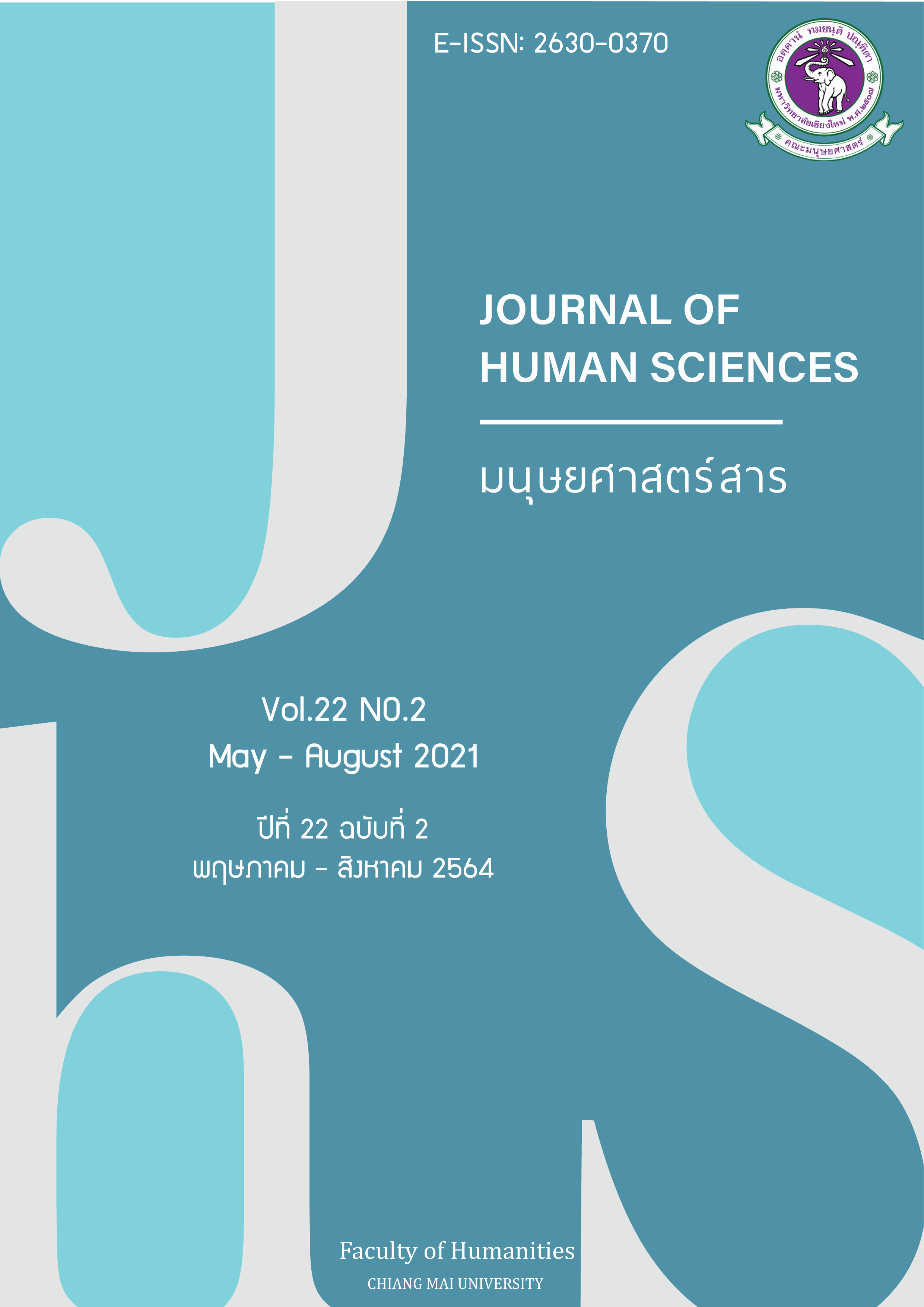ประวัติศาสตร์โรคซึมเศร้าในสังคมร่วมสมัย: การประกอบสร้างตัวตนภายใต้ร่างกายและ อัตลักษณ์ของความเจ็บป่วยบนพื้นที่จิตเวชศาสตร์สมัยใหม่
Main Article Content
บทคัดย่อ
การขยายตัวของโรคซึมเศร้าถือเป็นหนึ่งในปรากฏการณ์ที่มีความสำคัญอย่างมากในสังคมสมัยใหม่ โดยเฉพาะในช่วงสามทศวรรษที่ผ่านมาปัญหาทางอารมณ์ความรู้สึกกลายมาเป็นสิ่งที่ได้รับความสนใจอย่างกว้างขวางจากผู้คนในสังคม ความเข้าใจเรื่องโรคซึมเศร้ากลายมาเป็นสิ่งที่ทุกคนสามารถเข้าถึงได้ ผู้คนในสังคมสมัยใหม่เริ่มเรียนรู้ที่จะจัดการกับปัญหาความเศร้าในฐานะโรคที่อาจเกิดขึ้น ณ ช่วงใดช่วงหนึ่งในชีวิตของพวกเขา หรือเรียนรู้ที่จะมีปฏิสัมพันธ์อย่างถูกต้องกับผู้คนที่ป่วยเป็นโรคซึมเศร้าในสังคม อย่างไรก็ตามการเข้ามาของโรคซึมเศร้ามิเพียงทำให้ความรู้เกี่ยวกับโรคซึมเศร้าขยายตัวมากขึ้น แต่มันยังส่งผลกระทบต่อวิธีการที่ผู้คนคิด ทำความเข้าใจ ชั่งตวงวัด และลงมือกระทำการบนความสัมพันธ์ระหว่างพวกเขากับตัวพวกเขาเอง หรือกับผู้คนที่อยู่รอบข้างในรูปแบบใหม่ ภายใต้วิธีการให้เหตุผลใหม่ที่มาพร้อมความจริงที่ว่าด้วยความเศร้าในฐานะโรค โดยความเปลี่ยนแปลงดังกล่าวเกิดขึ้นภายใต้ความจริงแบบใหม่เรื่องความเศร้าที่กลายมาเป็นปัญหาทางอารมณ์ความรู้สึกในระดับร่างกายของมนุษย์ ผ่านการประกอบสร้างของความรู้ ความจริง และปฏิบัติการณ์หลากหลายชุดในสังคมร่วมสมัย บทความชิ้นนี้มุ่งที่จะศึกษาความเปลี่ยนแปลงดังกล่าว โดยอาศัยการศึกษาในเชิงวงศาวิทยาเพื่อตามหาร่องรอยของความสัมพันธ์ระหว่างการขยายตัวของโรคซึมเศร้ากับการเผยตัวของอัตลักษณ์แบบใหม่ของผู้คนที่สัมพันธ์กับร่างกายของพวกเขา ผ่านการวิเคราะห์จุดตัดที่แตกต่างและหลากหลายนับตั้งแต่การปรากฏตัวของอาการซึมเศร้าในฐานะความผิดปกติเชิงชีวการแพทย์ ประวัติศาสตร์ของการค้นพบเชิงจิตเภสัชวิทยา การสับเปลี่ยนเชิงความรู้บนพื้นที่จิตเวชศาสตร์ และการเปลี่ยนผ่านของวิธีการให้เหตุผลแบบใหม่ของความรู้ทางประสาทวิทยาศาสตร์ซึ่งการเข้ามาบรรจบกันอย่างไม่สืบเนื่องของเส้นลากของความเปลี่ยนแปลงทั้งหมดจะนำไปสู่การปรากฏตัวของตัวตนแบบใหม่ของผู้คนในสังคมร่วมใหม่ ภายใต้ความจริงแบบใหม่ที่ว่าด้วยความเศร้าในฐานะโรค
Article Details
เอกสารอ้างอิง
American Psychiatric Association. (1980). Diagnostic and Statistical Manual of Mental Disorders (3rd ed.). WA: American Psychiatric Association.
Baumeister, A. A., Hawkins, M. F., & Uzelac, S. M. (2003). The myth of reserpine-induced depression: role in the historical development of the monoamine hypothesis. Journal of the history of the neurosciences, 12(2). Retrieved from https://doi.org/10.1076/jhin.12.2.207.15535
Berardi, F. (2011). After the Future. CA: AK Press.
Brogan, K. (2019). Own Your Self: The Surprising Path beyond Depression, Anxiety, and Fatigue to Reclaiming Your Authenticity, Vitality, and Freedom. CA: Hay House.
Brown, W. A., & Rosdolsky, M. (2015). The clinical discovery of imipramine. The American journal of psychiatry, 172(5). Retrieved from https://doi.org/10.1176/appi.ajp.2015.14101336
Burchell, G. & Gordon, C. & Miller, P. (1991). The Foucault Effect: Studies in Governmentality. Chicago, US: University of Chicago Press.
Conrad, P. (2007). The Medicalization of Society: On the Transformation of Human Conditions into Treatable Disorders. Baltimore, US: The Johns Hopkins University Press.
Ehrenberg, A. (2010). The weariness of the self: diagnosing the history of depression in the contemporary age. Montreal: McGill-Queen's University Press.
Fisher, M. (2009). Capitalist realism: Is there no alternative?. Winchester, UK: Zero Books.
Foucault, M. (1995). Discipline & Punish: The Birth of the Prison. NY: Vintage Books.
Harper, F. (2017). Unfuck Your Brain: Getting Over Anxiety, Depression, Anger, Freak-Outs, and Triggers with science. Ohio, US: Microcosm.
Healy, D. (2002). The creation of psychopharmacology. London, UK: Harvard University Press.
Hillhouse, T. M., & Porter, J. H. (2015). A brief history of the development of antidepressant drugs: from monoamines to glutamate. Experimental and clinical psychopharmacology, 23(1). Retrieved from https://doi.org/10.1037/a0038550
Holmes, J. (2014). Psychodynamic psychiatry-rise, decline, revival. In S. Bloch, S. A. Green, &
J. Holmes (Eds.), Psychiatry: Past, Present, and Prospect (pp. 383 - 400). Oxford, UK: Oxford University Press.
Horwitz, A. & Wakefield, J. (2012). The Loss of Sadness: How Psychiatry Transformed Normal Sorrow into Depressive Disorder. Oxford, UK: Oxford University Press.
James, O. (2008). The Selfish Capitalist: Origins of Affluenza. London, UK: Ebury Press.
Kitanaka, J. (2012). Depression in Japan: psychiatric cures for a society in distress. NJ: Princeton University Press.
Kitanaka, J. (2015). The Rebirth of Secrets and the New Care of the Self in Depressed Japan. Current Anthropology, 56(S12). Retrieved from https://www.journals.uchicago.edu/doi/
full/10.1086/683273
Kline, S. (1974). From Sad to Glad: Kline on Depression. NY: Putnam.
Korb, A. (2015). Upward Spiral: Using Neuroscience to Reverse the Course of Depression, One Small Change at a Time. CA: New Harbinger.
Laing, R. D. (1967). The Politics of Experience and The Bird of Paradise. Middlesex, UK: Penguin Books.
Marsden, C. A. (2006). Dopamine: the rewarding years. British journal of pharmacology, 147. Retrieved from https://doi.org/10.1038/sj.bjp.0706473
Mayes, R., & Horwitz, A.V. (2005), DSM‐III and the revolution in the classification of mental illness. J. Hist. Behav. Sci., 41. Retrieved from https://doi.org/10.1002/jhbs.20103
Monbiot, G. (2019) Neoliberalism is creating loneliness. That’s what’s wrenching society apart. Retrieved from https://www.theguardian.com/commentisfree/
/oct/12/neoliberalism-creating-loneliness -wrenching-society-apart
Nutt, D. J. (2008). Relationship of neurotransmitters to the symptoms of major depressive disorder. The Journal of clinical psychiatry, 69. 4-7. Retrieved from
Pletscher, A. (1991). The discovery of antidepressants: a winding path. Experientia, 47(1). Retrieved from https://doi.org/10.1007/BF02041242
Rose, N. (1996). Inventing our selves: Psychology, power, and personhood. Cambridge, England: Cambridge University Press.
Rose, N. (1998). Life, Reason and History: reading Georges Canguilhem today. Economy and Society, 27. Retrieved from https://doi.org/10.1080/03085149800000009
Rose, N. (2007). The Politics of Life Itself: Biomedicine, Power, and Subjectivity in the Twenty-First Century. NJ: Princeton University Press.
Rose, N., & Abi-Rached, J. N. (2013). Neuro: The New Brain Sciences and the Management of the Mind. NJ: Princeton University Press.
Scheper-Hughes, N., & Lovell, A. M. (1986). Breaking the circuit of social control: lessons in public psychiatry from Italy and Franco Basaglia. Social science & medicine (1982), 23(2). Retrieved from https://doi.org/10.1016/0277-9536(86)90364-3
Schildkraut, J. J. (1965). The catecholamine hypothesis of affective disorders: a review of supporting evidence. The American journal of psychiatry, 122(5). Retrieved from https://doi.org/10.1176/ajp.122.5.509
Scull, A. (2015). Madness in civilization: a cultural history of insanity, from the Bible to Freud, from the madhouse to modern medicine. New Jersey, US: Princeton University Press.
Skultans, V. (2003). From damaged nerves to masked depression: inevitability and hope in Latvian psychiatric narratives. Social Science & Medicine, 56(12). Retrieved from https://doi.
org/10.1016/S0277-9536(02)00245-9
Sneader, W. (2005). Drug Discovery: A History. West Sussex, UK: John Wiley & Sons.
Summerfield, D. (2012). Afterword: Against “global mental health”. Transcultural Psychiatry, 49(3-4). 519-530. Retrieved from https://journals.sagepub.com/doi/10.1177/
Szmukler, G. (2014). Fifty years of mental health legislation: paternalism, bound and unbound. In H. Bloch, S. A. Green, & J. Holmes. (Eds.), Psychiatry: Past, Present, and Prospect (pp. 133 - 153). Oxford, UK: Oxford University Press.
Tansey, E. M. (2006). Henry Dale and the discovery of acetylcholine. Comptes rendus biologies, 329(5-6). 419-425. Retrieved from https://doi.org/10.1016/j.crvi.2006.03.012
Valenstein, E. (2006). The War of the Soups and the Sparks: The Discovery of Neurotransmitters and the Dispute Over How Nerves Communicate. New York, US: Columbia University Press.
Whitaker-Azmitia, P. (1999). The Discovery of Serotonin and its Role in Neuroscience. Neuropsychopharmacol, 21. 2-8. Retrieved from https://doi.org/10.1016/S0893-133X(99)00031-7
Wilkinson, R. G., & Pickett, K. (2009). The spirit level: why more equal societies almost always do better. NY, US: Bloomsbury.
Williams, M., Teasdale, J., Segal, Z., & Kabat-Zinn, J. (2007). The Mindful Way Through Depression: Freeing Yourself from Chronic Unhappiness. NY: The Guilford Press.
World Health Organization (2017). Depression and Other Common Mental Disorders: Global Health Estimates. Geneva, Switzerland: Authors.


